Roundworms?
 Ascarids, more commonly known as roundworms, are the most common type or worm parasite in dogs and cats. Humans are capable of acquiring roundworms as well. The two species common in dog are Toxocara canis and Toxascaris leonine. These worms live in both the stomach and the intestines. They grow up to 7 inches long. A female roundworm can lay up to 200,00 eggs, each protected by a hard shell, a day. Imagine how quickly they can spread at that rate. They are able to live for months or even years in the soil.
Ascarids, more commonly known as roundworms, are the most common type or worm parasite in dogs and cats. Humans are capable of acquiring roundworms as well. The two species common in dog are Toxocara canis and Toxascaris leonine. These worms live in both the stomach and the intestines. They grow up to 7 inches long. A female roundworm can lay up to 200,00 eggs, each protected by a hard shell, a day. Imagine how quickly they can spread at that rate. They are able to live for months or even years in the soil.
There are four ways dogs can pick up roundworms. The first is prenatal infection. This occurs when the larvae migrate through the placenta to the unborn puppy. This is very common and almost all puppies are infected. Another way a puppy can get them is through their mother’s milk. Since the roundworms live in the soil, both adults and puppies can become infected by ingesting eggs from the ground. Last but not least a dogs can acquire the eggs by ingesting an immediate host, or carrier animal, such as a mouse.
The life cycle of a t. canis in young puppies is quite a journey. The eggs enter through the puppies mouth then hatch in the stomach. After hatching the larvae travel to the lungs through the circulatory system. Once in the lungs they break though the capillaries and into the air sacs. This causes coughing or gagging. They then crawl up the windpipe and are swallowed. Once again they are in the intestines and this time they develop into adult worms.
Puppies older than 6 moths will develop a resistance towards roundworms. Few, if any larvae will complete the lifecycle. Instead most of them will encyst in bodily tissues. Simply means they will enclose and become a cyst. Here they are protected against the dog’s antibodies and most dewormers. Interceptor is a dewormer that has had some effect on encysted larvae. Once a female dog is pregnant, these encysted larvae are activated and migrate to the mammary glands and placenta. Deworming the female before pregnancy may reduce the amount of larvae but will not eliminate all puppy infestations because there are still some encysted larvae in the mother’s body.
Although roundworms will rarely cause symptoms in adult dogs, puppies may have some. A puppy older than two months may have some vomiting or diarrhea and the worms can been seen in both. They will look like moving strands of white spaghetti. Not too pleasant to look at but if you see these you need to take action. If a puppy has a heavy infestation it can cause serious illness or death. You will notice these puppies having a dull coat, potbelly, a failure to thrive, and they may be anemic or have stunted growth.
Treatment of Roundworms
When treating puppies one must be cautious, the little ones are very fragile still. Nemex is great for nursing puppies. It is safe and works against not only roundworms, but hookworms as well. These puppies should be dewormed before they are two weeks old so they do not begin to pass the eggs that will contaminate the environment. In order to make sure you kill off worms that were in the larval stage during the first treatment, repeat deworming at 4, 6, and 8 weeks old. If eggs or worms are still found in the stool afterwards consider more treatments and take a trip to the vet.
Most treatments are effective against multiple types of worms. Drontal Plus, Vercom Paste, Telmintic, and Panacur are also effective against hookworms and whipworms. Drontal and Vercom work against tapeworms. Panacur is great to deworm the female during the last two weeks of gestation and during lactation will reduce environmental exposure and will help control puppy infestation.
Just like in every other health issue, prevention is always the best idea. Interceptor, a heartworm preventative will help not only with roundworms but to prevent hookworms and whipworms as well. HeartGard Plus is another notable brand and will help with roundworms and hookworms.
 When it comes to humans, we know children are known to have a history of eating dirt. I remember making mud pies and being exceptionally proud of my cooking! It is possible for children to acquire roundworm eggs through the dirt. Handling infected puppies may also be a cause of human infestation. This can cause visceral larva migrans, a serious disease. Because humans are not a definitive host of ascarids the larvae cannot progress into an adult. Instead they will burrow in the intestinal wall and begin to migrate to the skin, liver, and lungs. Symptoms include abdominal pain, coughing and wheezing, itching, and skin rash. These symptoms will only develop if the infestation is heavy and has reached the heart, kidneys, spleen, brain, eyes, or other tissues. If the problem is serious it can lead to a syndrome called ocular larva migrans. This can lead to blindness and possibly the need to remove an eye. I can’t imagine any parent wanting this to be a possibility, so take caution when dealing with worms and be sure to treat when needed.
When it comes to humans, we know children are known to have a history of eating dirt. I remember making mud pies and being exceptionally proud of my cooking! It is possible for children to acquire roundworm eggs through the dirt. Handling infected puppies may also be a cause of human infestation. This can cause visceral larva migrans, a serious disease. Because humans are not a definitive host of ascarids the larvae cannot progress into an adult. Instead they will burrow in the intestinal wall and begin to migrate to the skin, liver, and lungs. Symptoms include abdominal pain, coughing and wheezing, itching, and skin rash. These symptoms will only develop if the infestation is heavy and has reached the heart, kidneys, spleen, brain, eyes, or other tissues. If the problem is serious it can lead to a syndrome called ocular larva migrans. This can lead to blindness and possibly the need to remove an eye. I can’t imagine any parent wanting this to be a possibility, so take caution when dealing with worms and be sure to treat when needed.
Do not Wait if Fido has Roundworms
As much as we want to think “that’ll never happen to me,” there is a very good chance it will if you are dealing with dogs and especially new puppies. Be sure to know what to do when the problem arises
Other Popular Health Articles
Common Health Problems
Credits Here

